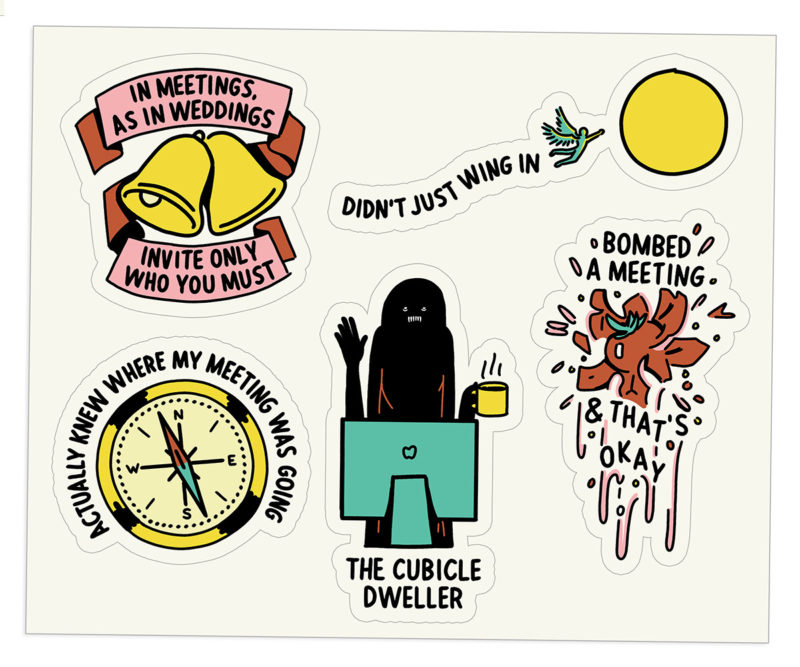Emma: Running meetings is hard the way cooking is hard. It takes practice to get good, even if you are following a recipe. And everyone expects such different things from their food! I get so overwhelmed if I try to accommodate what everyone thinks tastes good.
Andy: Seriously. And while we both have ways we tend to run our meetings, this isn’t going to be about that.
Emma: Nope! Meetings are too unpredictable to say “here’s how to do a good one.” I can prep for hours, email out agendas, require prep work, rehearse in the bathroom mirror, establish meeting rules, and still end up having to wing it. (Let me just say for the record: I don’t love winging things.)
Andy: Instead, we’re going to talk about how we approach the concept of meetings, and some of the things that have helped make them less scary.

You need time on stage.
Emma: Running good meetings is only something you learn by leading bad ones.
Andy: It’s like stand-up. You are going to bomb. There will be hecklers. The meeting right before yours is going to be run by freaking Robin Williams. There are so many variables that you only know how to handle by exposing yourself to them again and again. Eventually, you’re going to find your style and an audience that appreciates you. Knowing that helps me take all the hits along the way gracefully.
Start small.
Andy: I have the same advice for meetings and weddings: Invite only who you absolutely have to.
Emma: To this day, my favorite meetings are with my closest peers, or just my top performers, working together on one problem. Starting out with team-wide or cross-team stuff is crazy — you’re simultaneously having to build trust, impart knowledge, control the room, react to a bunch of people you may not know very well.
Andy: A great way to ease into those more complicated scenarios is by taking over a meeting that already exists. That way you’re not inventing a meeting from scratch while you’re just trying to get some stage time. As a bonus, you can try adopting the original person’s act. What feels like you? What doesn’t match your style?
Emma: Small isn’t just headcount either. Marie Kondo doesn’t have you sort your garage, closet, and kitchen all at once, and one meeting can’t solve the company reporting structure, marketing strategy, and core values. Go for tiny, concrete objectives in 25-minute chunks. Even the kitchen is too big for that. Start with the silverware drawer.
Know your objective. Like, really know it.
Emma: When I’m putting a meeting together, I can very easily get caught up in how long different phases should take, or what format will be the most engaging, or how I’m going to encourage participation. It’s like I’m planning the snacks for a road trip, and researching where the biggest ball of yarn is, without knowing where I’m going.
Often this is because I think the objective is obvious or implied. If I’m hosting a brainstorm meeting, the ideal outcome is “a bunch of ideas,” right? But I force myself to be more specific than that: “I want to leave with five potential solutions to this problem I can run the numbers on.”
When I know exactly what I want to walk away with, I can work backward.
Andy: Right. That ideal outcome becomes your outline for the meeting.
• Welcome + This is the outcome we’re after + This is what what we’ll be doing to get to that outcome
• Do that thing
• Mid-way check: Can we get to that outcome? Do we need to adjust?
• Recap + assign next steps
No one can argue with that structure.
Emma: That mid-way check is where your learning happens. Not enough time to get to my outcome, even if I kick it into high gear? A lot of times it’s because my ideal outcome was too big and ambitious. That’s okay. I’ll shrink down my expectations next time.
A live audience is the worst thing about meetings, and the best.
Emma: Failing publicly is worse than failing privately. That threat — that I’m going to be caught up in the front of a room stammering out an answer I hadn’t prepared for, or trying to wrest control of a conversation that’s gone off the rails — is intimidating.
Andy: It’s that threat that keeps us locked behind our computer screens, sending out well-edited wikis and memos and Slacks. I’ve been there. But just because you can’t see what’s happening when someone reads what you’ve written doesn’t mean you’re not still failing publicly. You just don’t know it. And that’s worse.
Emma: And you don’t get to experience the positive stuff of having a live audience!
Andy: Totally. I love being able to watch and feel people get it, see my team engage and respond. And I like showing people who I am.
Emma: She laughs! She’s human!

Good Boss Achievement Stickers: Meetings Meetings Meetings Edition


